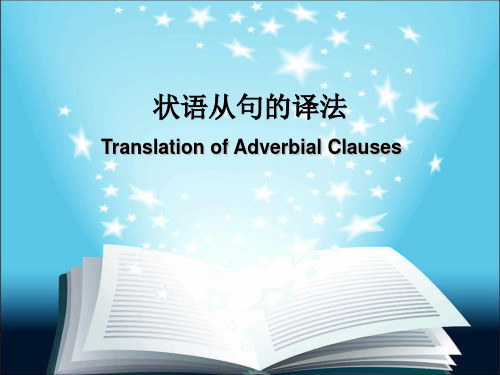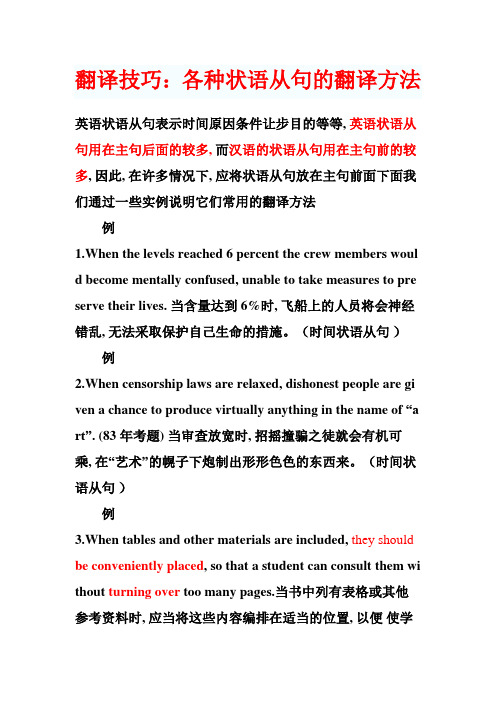浅析状语从句的翻译方法
- 格式:pdf
- 大小:238.96 KB
- 文档页数:2


翻译技巧:各种状语从句的翻译方法英语状语从句表示时间原因条件让步目的等等,英语状语从句用在主句后面的较多,而汉语的状语从句用在主句前的较多, 因此, 在许多情况下, 应将状语从句放在主句前面下面我们通过一些实例说明它们常用的翻译方法例1.When the levels reached 6 percent the crew members would become mentally confused, unable to take measures to pre serve their lives. 当含量达到6%时, 飞船上的人员将会神经错乱, 无法采取保护自己生命的措施。
(时间状语从句)例2.When censorship laws are relaxed, dishonest people are gi ven a chance to produce virtually anything in the name of “a rt”. (83年考题) 当审查放宽时, 招摇撞骗之徒就会有机可乘, 在“艺术”的幌子下炮制出形形色色的东西来。
(时间状语从句)例3.When tables and other materials are included,they should be conveniently placed, so that a student can consult them wi thout turning over too many pages.当书中列有表格或其他参考资料时, 应当将这些内容编排在适当的位置, 以便使学生在查阅时, 不必翻太多的书页。
(时间状语从句)例4.This happens when a fact is discovered which seems to con tradict what the “law” would lead one to expect. 每当发现一个事实使人感到与该定律应得出的预期结论相矛盾的时候, 就发生这种情况(时间状语从句)例5.Now since the assessment of intelligence is a comparative matter we must be sure that the scale with which we are com paring our subjects provides a ’valid’ or ’fair’ comparison. ( 92年考题)既然对智力的评估是比较而言的, 那么我们必须确保, 在对我们的对象进行比较时, 我们所使用的尺度能提供“有效的”或“公平的”比较(原因状语从句)例6.The policies open to developing countries are more limited than for industrialized nations because the proper economie s respond less to changing conditions and administrative con trol. 由于贫穷国家的经济对形势变化的适应能力差一些, 政府对这种经济的控制作用也小一些, 所以发展中国家所能采取的政策比起工业化国家来就更有局限性(原因状语从句)例7.For example, they do not compensate for gross social inequ ality, and thus do not tell how able an underprivileged young ster might have been had he grown up under more favorable circumsta nces. (95年考题) 例如, 他们(测试)并不对社会总的不平等作出补偿, 因此, 测试不能告诉我们, 一个社会地位低下的年轻人如果生活在较为优越的条件下, 会有多大的才能(结果状语从句)例8.It also plays an important role in making the earth more habita ble, as warm ocean currents bring milder temperatures to places that would otherwise be quite cold. 由于温暖的洋流能把温暖的气候带给那些本来十分寒冷的地区并使之变暖, 因此, 海洋在使我们这个地球更适合人类居住方面也扮演一个重要的角色(原因状语从句)例9.Electricity is such a part of our everyday lives and so much tak en for granted nowadays that we rarely think twice when we swi tch on the light or turn on the radio. (84年考题) 电在我们的日常生活中所占的地位是如此重要, 而且现在人们认为电是想当然的事, 所以我们在开电灯或开收音机时, 就很少再去想一想电是怎么来的(结果状语从句)例10.The first two must be equal for all who are being compared, if any comparison in terms of intelligence is to be made. (92年考题) 如果要从智力方面进行任何比较的话, 那么我们对所有被比较者来说, 前两个因素必须是一致的(条件状语从句 ) 例11.Although television was developed for broadcasting, many i mportant uses have been found that have nothing to do with it. 虽然电视是为了广播而发明的, 但是电视还有许多与广播无关的重要用途(让步状语从句 )例12.Though the cost of the venture would be immense, both in la bour and power, many believe that iceberg towing would prove l ess costly in the long run than the alternative of desalination of s ea water. 这种冒险的代价, 不管是在人力还是在能源消耗方面, 都将是巨大的然而, 许多人认为, 冰山牵引最终会证明比选择海水脱盐法花费要少(让步状语从句 )例13.Therefore, although technical advances in food production and processing will perhaps be needed to ensure food availability, meeting food needs will depend much more on equalizing econo mic power among the various segments of populations within th e developing countries themselves. 因此, 尽管也许需要粮食生产和加工方面的技术进步来确保粮食的来源, 满足粮食需求更多的是取决于使发展中国家内部的人口各阶层具有同等的经济实力(让步状语从句 )例14.Whether the characters portrayed are taken from real life or a re purely imaginary, they may become our companions and frien ds. 无论书中描述的角色来自真实生活还是来自纯粹的想象, 他们都可能成为我们的伙伴和朋友(让步状语从句 ) 例15.By many such experiments Galileo showed that, apart from d ifferences caused by air resistance, all bodies fall to the ground a t the same speed, whatever their weight is. 伽利略经过多次这类实验证明, 一切物体, 不论其重量如何, 除了因空气阻力引起的差别外, 都是以同样的速度落向地面的(让步状语从句.) 来英汉两种语言中的状语的表达本该有很大的差异,但在中文的译文里,英文各类状语从句结构却屡见不鲜,比如我们常常会看到这样的句子:"他是如此的累,以至于不能再工作下去。

状语从句汉译英技巧1. 时间状语从句:-当……时:When we arrived, the party had already started.-一……就……:As soon as he heard the news, he rushed to the hospital.-在……之前:Before you go to bed, remember to turn off the lights.-在……之后:After he finished his homework, he went for a walk.2. 地点状语从句:-在……地方:Wherever you go, I will follow you.-到……地方:We will stay here until the rain stops.3. 原因状语从句:-因为:Because it was raining, we decided to stay indoors.-由于:Due to the bad weather, the flight was delayed.-既然:Since you are here, let's have dinner together.4. 条件状语从句:-如果:If you study hard, you will pass the exam.-假如:Suppose it rains tomorrow, what will you do?-只要:As long as you work hard, you will succeed.5. 方式状语从句:-以……方式:He explained the problem in a way that everyone could understand. -用……方法:She solved the puzzle by using logic and reasoning.。



状语从句如何翻译?状语从句如何翻译?引导语:状语从句内容丰富,涉及面广,可以用来表示时间、原因、条件、让步、目的、结果、等意义,那么状语从句如何翻译呢?下面就和店铺一起来看看方法吧。
一、时间状语从句在英语中,时间状语从句的连接词常常有:when(当...的时候),whenever(每当...),as(当...时),since(自从...),until(直到...,如果不....),till(直到...),before(在...前),after(在...后),as soon as(一...就),once(一旦...),the moment(一...就),immediately(一...就),the day(在...那天),no sooner... than(一...就),hardly(scarcely)... when(一...就),the instant(一...就),instantly(一...就),directly(一...就),the minute(一...就),the second(一...就),every time(每当...),by the time(等到....的时候)等。
翻译的时候,一般翻译在主句的前面。
(一)译成相应的时间状语While she spoke, the tears were running down.她说话时,泪水直流。
As he finished the speech, the audience burst into applause.他结束讲话的时候,听众掌声雷动。
(二)译成“一(刚、每)...就”的结构Directly he uttered these words there was a dead silence.他刚说出这些话,大家就沉默下来。
(三)译成条件句由于时间状语的引导词除了显示时间关系之外,有时候可以表示条件关系,所以还可以翻译为条件句。
Turn off the switch when anything goes wrong with the machine.如果机器发生故障,就把电门关上。
英语语法:五类状语从句的翻译讲解一、时间状语从句1. 译成相对应的时间状语1) 与原文顺序一致While she spoke, the tears were running down.她说话时,泪水直流。
2) 后置改前置Please turn off the light when you leave the room.离屋时请关灯。
2. 译成“刚(一)……就……”的句式When I reached the beach, I collapsed.我一游到海滩,就昏倒了。
3. 译成并列的分句1) 译文前置They set him free when his ransom had not yet been paid.他还没有交赎金,他们就把他释放了。
2) 后置不变I was about to speak when Mr. Smith cut in.我正想讲,史密斯先生就插嘴了。
二、原因状语从句1. 译成表“因”的分句1) “因”在“果”之前The crops failed because the season was dry.因为气候干旱,作物歉收。
2) “果”在“因”之前She could get away with anything, because she looked such a baby.她能渡过任何风险,因为她看上去简直还像娃娃模样。
2. 译成因果偏正复句中的主句Pure iron is not used in industry because it is too soft.纯铁太软,所以不用在工业上。
Because he was convinced of the accuracy of this fact, he stuck to his opinion.他深信这件事准确可靠,所以坚持己见。
3. 译成无关联词的因果关系并列分句Where there is sound, there must be sound waves.哪里有声音,哪里就必有声波。
英译汉翻译技巧9状语从句的翻译状语从句的翻译英语中状语从句用得比较多,位置也比较灵活。
根据汉语的特点,汉译时位置往往这样处理:比较和结果状语从句放在主句后面;方式状语从句可前可后;其他状语从句(时间、条件、原因、目的、结果或让步等)一般放在主句之前。
时间状语从句一、译成相应的时间分句1) From her second floor window she could see the postman when he came.邮差来时,她从三楼的窗口望出去就可以看见。
2) After what had happened he could not continue to work there.事情发生后,他无法在那里继续工作下去了。
二、译成并列分句1) She sobbed as she told us her miserable past.她一边向我们叙述她悲惨的过去,一边啜泣着。
2) While there is life,there is hope.留得青山在,不怕没柴烧。
三、译成“刚(一)·····就······”的句型1)Stormy applause broke forth the moment she appeared on the stage.她在台上一出现就响起了暴风雨般的掌声。
2)Scarcely had we gathered in the grain when it began to rain.我们刚把粮食收进来,就下雨了。
四、由until/till引导的从句译法1) I don't like meeting people until I have this dental work done.在我牙齿修补好之前,我不想会客。
分析:主句否定时,把until 当作 before来译。
英语语法:五类状语从句的翻译讲解一、时间状语从句1. 译成相对应的时间状语1) 与原文顺序一致While she spoke, the tears were running down.她说话时,泪水直流。
2) 后置改前置Please turn off the light when you leave the room.离屋时请关灯。
2. 译成“刚(一)……就……”的句式When I reached the beach, I collapsed.我一游到海滩,就昏倒了。
3. 译成并列的分句1) 译文前置They set him free when his ransom had not yet been paid.他还没有交赎金,他们就把他释放了。
2) 后置不变I was about to speak when Mr. Smith cut in.我正想讲,史密斯先生就插嘴了。
二、原因状语从句1. 译成表“因”的分句1) “因”在“果”之前The crops failed because the season was dry.因为气候干旱,作物歉收。
2) “果”在“因”之前She could get away with anything, because she looked such a baby.她能渡过任何风险,因为她看上去简直还像娃娃模样。
2. 译成因果偏正复句中的主句Pure iron is not used in industry because it is too soft.纯铁太软,所以不用在工业上。
Because he was convinced of the accuracy of this fact, he stuck to his opinion.他深信这件事准确可靠,所以坚持己见。
3. 译成无关联词的因果关系并列分句Where there is sound, there must be sound waves.哪里有声音,哪里就必有声波。
浅析状语从句的翻译方法发表时间:2009-05-19T14:01:13.717Z 来源:《中华现代教育》总第36期供稿作者:张欲晓[导读] 由于英汉两种语言的差异,对于状语从句的翻译也就有着不同的译法,具体采用哪种翻译方法是和状语从句的分类密切相关的。
为此,深入探讨其多种译法,对于提高翻译水平十分有益。
【摘要】由于英汉两种语言的差异,对于状语从句的翻译也就有着不同的译法,具体采用哪种翻译方法是和状语从句的分类密切相关的。
为此,深入探讨其多种译法,对于提高翻译水平十分有益。
【关键词】状语从句;分类;翻译状语从句是英汉两种语言中都存在的语言现象。
英语的状语从句根据功能可分为时间、地点、原因、让步、条件、目的、结果、比较和方式状语从句等。
有些状语从句的位置比较灵活,有前有后。
此外,英语中各类状语从句都有明显的反映其逻辑关系的连接词。
汉语的状语从句与英语的状语从句最大区别就在于状语从句的位置和连接词。
一般说来,英语中表示方式、比较和结果等关系的状语从句位于主句之后,其它状语从句的位置比较灵活,可前可后。
汉语中多数状语从句是放在主句之前,只有比较和结果状语从句位于主句之后,方式状语从句则可前可后。
在翻译状语从句时,无论是英译汉,还是汉译英,我们应注意以下几点:首先,应注意各类状语从句在英汉两种语言中的位置差异,在译文中适当调整语序,相应地译成符合译文表达习惯的状语从句。
其次,应注意连接词,分清主句和从句之间的逻辑关系,尤其是在汉译英时,因为汉语造句多用意合法,一些连接词往往省略。
第三,英译汉时,尽量避免机械地照搬连接词的汉语对应词或译义,在准确理解主句和从句间的逻辑关系后,进行相应的句型转换,如将英语的时间状语从句译为汉语的并列句或条件句,地点状语从句译为汉语的条件句等。
第四,汉译英时,应注意主语的使用。
一、英语状语从句的翻译1.状语从句前置英语中的时间、地点、条件、原因等状语从句可前可后,而汉语中的这类状语从句一般前置;英语中表示条件的状语从句一般位于句首,尤其是虚拟条件句,这类条件句常常采用顺译法,将从句置于句首;英语中的让步状语从句前后均可,而汉语则前置为多。
Culture shock does not seem like a very helpful experience, when you are going through its four stages.当你在经历文化冲击的四个阶段时,它似乎并不是一件有益的事。
(时间状语从句)Whenever we go, we must build up good relations with people.我们不论到什么地方,都要和人们把关系搞好。
(地点状语从句)Since we live near the sea, we enjoy a healthy climate.因为我们住在海滨,所以能享受到有益健康的气候。
(原因状语从句)2.状语从句后置汉语中表原因、时间、条件、让步的从句一般前置,但有时也将它们放在主句后面,此时,从句含有补充说明的作用。
英语中表示比较、结果、方式和目的的状语从句汉译时可后置。
I had been puzzling over the problem for over an hour without any result, when suddenly solution flashed across my mind.这个问题把我难住了一个多小时,后来我突然开窍了,找到了答案。
(时间状语从句)A rocket must attain a speed of about five miles per second so that it may put a satellite in orbit.火箭必须获得大约每秒5英里的速度,以便把卫星送入轨道。
(目的状语从句)These trees and plants in the sea are so far from the top of the water that no one can see them.海底的这些树木和植物离水面太远,所以没有人能看见它们。
(结果状语从句)3.状语从句的转换有些状语从句从形式上看是某种状语从句,但从其主句和从句的逻辑意义来看,却不属于该种状语从句,而属于另一种从句。
此时,汉译时就可根据主句和从句的逻辑意义,进行适当的转换,将其翻译成为另一种句型。
如将时间状语从句译为条件句或让步状语从句,地点状语从句译为条件句或结果状语从句等等。
When the molecules of a solid move fast enough, the solid melts and becomes a liquid.(时间状语从句)如果固体内的分子达到一定的运动速度,固体就融化为液体。
(条件从句)Where there is sound, there must be sound waves.(地点状语从句)如果有声音,就一定有声波。
(条件状语从句)Whatever you fellows are recommending today, you will be sorry about a week from now.(让步状语从句)不管你们这些人今天提出什么意见,从现在起,你们将有一个星期的日子是难过的。
(条件分句)4.省略连词由于汉语造句采用意合法,汉语的复合句常常省略连词。
因此,翻译英语中有些状语从句中的连词时,省略比译出更符合汉语表达习惯。
此时从句和主句之间可能成为并列关系,或与主句紧缩为一个句子。
He came here in 1985, when he was only a little boy. (时间状语从句)他于1985 年来到这里,那时他还只是一个小男孩。
(并列句)Peter never cares for other people’s interest because he is extremely selfish. (原因状语从句)彼得极端自私,他不会关心别人的利益。
(并列句)If you melt two or more metals together, you can get a new metal. (条件状语从句)一起熔化两种以上金属,就可产生一种新金属。
(紧缩句)二、汉语偏正复句的英译汉语中由两个或两个以上的单句构成的句子称为复句。
汉语中复句分为联合复句和偏正复句。
偏正复句是由一个正句和一个偏句构成,大体上相当于英语的主从复句。
汉语偏正复句中的偏句相当于英语的状语从句,其主句和偏句之间的关系可分为让步、转折、假设、条件、因果和目的等几种关系。
1.将汉语中带有连接词的偏正复句译为英语中相应的状语从句汉语中有许多表示让步、转折、假设、条件、因果和目的等关系的连接词。
因此,汉语偏正复句的英译时,可直接将各种偏正复句译为相应的英语状语从句。
例如:只要我们坚持改革开放政策,就一定能把我国建设成为强大的社会主义强国。
As long as we stick to the reform and opening-up policy, we shall surely be able to build China into a powerful socialist country.尽管她能言善辩,却输了这场演讲比赛。
Eloquent as she was, she was losing the speech contest.我们坐在前排以便看得清楚。
Let’s take the front seats so that we may see more clearly.2.将汉语中偏正复句的偏句译为英语中的分词短语、不定式短语、介词短语作状语根据汉语偏正复句中主句和偏句的逻辑关系,可以将偏句译为英语中的分词短语、不定式短语、介词短语作状语,同时省略连接词。
例如:如果管理得好一些,这块地的小麦还可以长得更好一点。
Given better attention, the wheat in the plot could have grown better.由于他们的帮助,我们才提前完成了自己的工作。
Thanks to their help, we finished our work ahead of time.为了交学费,他不得不在课余时间打工。
To pay for his tuition, he has to find something to do in his spare time.3.将汉语中的并列句、排比句、对偶句和紧缩句译为英语的状语从句汉语的造句常常将表示逻辑关系的连接词省略,这是因为汉语造句采用意合法,叙事按事物发展的先后顺序或逻辑顺序来安排,分句之间的逻辑关系常常蕴涵在上下文中;而英语造句采用形合法,分句之间常常需要表示逻辑关系的连接词来连接。
因此汉译英时,必须充分理解分句之间的逻辑关系,选择适当的连接词。
例如:前途是光明的,道路是曲折的。
While the prospects are bright, the road has twists and turns.打肿脸充胖子,吃亏是自己。
If you get beyond your depth, you will suffer.狼披羊皮还是狼。
A wolf remains a wolf even though it is in sheep’s clothing.在理解、翻译状语从句时,我们一定要在忠实原文的基础上,结合其所在的语境,灵活处理,使之符合汉语的表达习惯,达到忠实、通顺的最佳结合。
【参考文献】[1] 胡晓吉. 实用英汉对比翻译[M].北京:中国人民大学出版社,1990.[2]梁仪.翻译理论与技巧(上)[M].成都:成都科技大学出版社,1995.[3] 陆国强.英汉和汉英语义结构对比[M].上海:复旦大学出版社,1997.作者简介:张欲晓,女,辽宁沈阳人,上海电力学院外语系副教授,硕士。